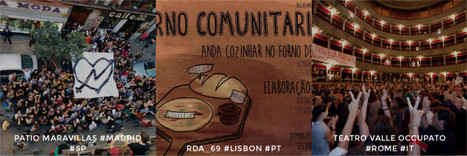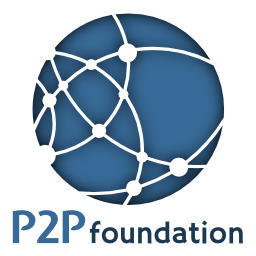 Your new post is loading...
During boom years, it takes land owners only three years to recuperate a lifetime of taxes through the rising land values.
This is excerpted from the second part of an in-depth review of the book, Commun, by Martin O’Shaughnessy. Here, first in summary, are the nine propositions: * Proposition 1: it is necessary to construct a politics of the common: * Proposition 2: we must mobilise rights of use to challenge property rights. * Proposition 3: …
P2P Plazas: one year of research looking for interesting, challenging and inspiring autonomous experiences in Southern Europe
Rob Hopkins introduces the Transition Network's new book compilation: '21 Stories of Transition'
“I believe in public ownership, but I have never favoured the remote nationalised model that prevailed in the post-war era. Like a majority of the population and a majority of even Tory voters, I want the railways back in public ownership. But public control should mean just that, not simply state control: so we should have passengers, rail workers and government too, co-operatively running the railways to ensure they are run in our interests and not for private profit. This model should replace both the old Labour model of top-down operation by central diktat and Tories favoured model of unaccountable privatised operators running our public services for their own ends.” Jeremy Corbyn
A useful distinction explained by Peter Barnes: “Common wealth is hugely valuable. We couldn’t live without it, and we certainly couldn’t have the amazingly productive economy we now have without it. The trouble is that the market doesn’t see this common wealth—it’s like the dark matter of the economic universe. And that’s what needs to …
* Report: Causa Justa::Just Cause (CJJC). Development Without Displacement: Resisting Gentrification in the Bay Area, 2013. Cat Johnson reviewed this 112-page document, which was prepared in collaboration with the Alameda County Public Health Department, proposing steps that cities like Oakland can take to stop displacement of historic residents. Though from 2013, we publish it here …
Society is distinct from the economy in that no direct monetary rewards flow from participation. Being popular may help you make money, and having money may in turn make you popular, but no one is paid a fee for his personal popularity, nor can I pay people to like me. The autonomy of society is limited but nevertheless real.
By converting land into commonwealth – capturing escalating land values for everyone’s benefit – it is possible to make housing more affordable and to finance all sorts of infrastructure and services that make communities more stable, attractive and thriving.
In this age of marauding markets, it almost seems quaint to ask, “Who owns culture?” We know the answer. When push comes to shove, the owners of copyright, trademarks and patents own everything. We may think that the music, images and stories of our culture belong to us, but as a matter of law, in the 165+ countries that have signed the Berne Convention, our designated role is....to buy (and not use someone else's "property.")
|
During boom years, it takes land owners only three years to recuperate a lifetime of taxes through the rising land values. A brilliant explanation by Fred Harrison. Watch the video here:
Can the commons serve as an alternative to the corporate or state domination of big data, the lifeblood of this dawning digital world? Can it serve as the foundation for collective empowerment? Can it provide a means of criticizing the IT corporations’ perception of themselves? From the Berliner Gazette, presenting the project, ‘Big Data in …
“Data on patterns and infrastructure must be a collective property, managed by the government. Each new player on the market must have a chance to become at least as large as other providers. A decentralized market benefits the user and provides tax revenues that could be collected locally. We look forward to the introduction of …
* Briefing Paper: Keeping Land Local. Reclaiming Governance from the Market. Land Struggles III: LRAN Briefing Paper Series, Saturday 25 October 2014 Here’s a summary: “The governance of land, forests, water bodies and associated “natural resources” has always been a deeply contested terrain, and one that has frequently resulted in conflicts among different actors who …
One age builds upon the last. We do not go back, but carry forward the former ages in new ways. In the industrial age, we industrialized agriculture. In the age of finance, we financialized industry. As we move into a more ecologically sensitive era, we will need to ecologize finance. And we will need to socialize it — make it more inclusive, less elite. Redesigning the social architectures of our economy is a vital part of transformation—as vital as redesigning the physical architectures of our energy and product system. My sense is we are … entering an era with a multiplicity of ownership designs – a time of biodiversity in social architecture, beyond the monoculture of the corporate form.
By Pat Conaty: “The Dublin CLT conference last week really engaged everyone in the room including the leading housing policy expert in Ireland, Rory O’Donnell. His presentation was masterful and echoed the other ones. Architects, planners, grassroots people, politicians from Dublin and elsewhere were all in the room. We were linking up last week commons …
“As Polanyi highlights in the Great Transformation, land enclosure evolved over centuries and in England was accelerated by thousands of Parliamentary acts of land enclosure in the eighteenth and nineteenth century. He highlights that resistance to a self-regulating market economy required the liquidation of the beneficial constraints exercised by usury laws, the rights of commoners, the guilds and other kinship and civil society institutions. In England the struggle to preserve these constraints by the working class was fierce between the 1770s and 1850. The resistance to land enclosure in Newcastle Upon Tyne led to the practical proposal of Thomas Spence for Parish Land Trusts. Proposed in 1775 these were to be set up to hold rural and urban land in trust on behalf of local people and to capture economic rent for the benefit of the citizens. The Spence Plan influenced wider thinking. Robert Owen’s plan for Villages of Unity and Co-operation from 1817 sparked the development of the co-operative movement. David Ricardo invested in Owen’s New Lanark scheme and argued for taxation of unearned economic rents in his Principles of Political Economy and Taxation in 1817.
“Left on their current course and driven by the needs of capital, digital technologies can be deployed in ways that are extraordinarily inimical to freedom, democracy, and anything remotely connected to the good life. Therefore battles over the Internet are of central importance for all those seeking to build a better society”, writes researcher Robert McChesney in the conclusion of his book Digital Disconnect: How Capitalism is Turning the Internet Against Democracy[1]. P rofessor at the University of Illinois at Urbana–Champaign, McChesney studies the history and political economy of communication. He is also co-founder of Free Press, a national media reform organization in the USA. In the following interview with ALAI, he summarizes the arguments of his book, with emphasis on the tendency of the Internet economy to promote monopolies.
Social media services can ultimately be run as public utilities, ad-free, at cost, in a democratic spirit and for social ends, in their enormous variety—or else digital society can become ever more subservient to the single end of the accumulation of private capital. The choice is between social life as an advertising platform and socialized social media.
|
 Your new post is loading...
Your new post is loading...


















